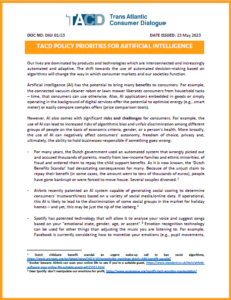 Our lives are dominated by products and technologies which are interconnected and increasingly automated and adaptive. The shift towards the use of automated decision-making based on algorithms will change the way in which consumer markets and our societies function.
Our lives are dominated by products and technologies which are interconnected and increasingly automated and adaptive. The shift towards the use of automated decision-making based on algorithms will change the way in which consumer markets and our societies function.
Artificial intelligence (AI) has the potential to bring many benefits to consumers. For example, the connected vacuum cleaner robot or lawn mower liberates consumers from household tasks – time, that consumers can use otherwise. Also, AI applications embedded in goods or simply operating in the background of digital services offer the potential to optimise energy (e.g., smart meter) or easily compare complex offers (price comparison tools).
However, alongside the benefits, AI also introduces significant risks and challenges for consumers. The very systems designed to enhance our lives can inadvertently perpetuate algorithmic bias and unfair discrimination based on economic criteria, gender, or health status. Moreover, the use of AI has the potential to encroach upon consumer autonomy, freedom of choice, privacy, and even hinder the ability to hold businesses accountable for errors or misconduct.
In light of these challenges, TACD supports regulatory efforts throughout Europe and the United States, urging them to include at least the following points:
- All entities responsible for AI systems should comply with mandatory rules, including transparency, accountability, and fairness with respect to both algorithms and the data fed into algorithmic systems.
- Strike the right balance when defining AI.
- Certain applications of AI must be banned or placed on an indefinite moratorium.
- Before being placed on the market or used continually, AI systems that convey high-risk must undergo a third-party audit that meet rigor and independence standards, including an audit of their impact on fundamental rights.
- Involve civil society stakeholders in the design of standards for AI systems.
- Right to object and request human review of a decision which can have a significant impact.
- Human oversight requirement.
- Put privacy-by-design at the heart of all AI systems.
- Implement security by design principles.
- Individuals and consumers should be granted a right to complain and a right to collective redress when dealing with AI systems.
Read the full recommendations here
